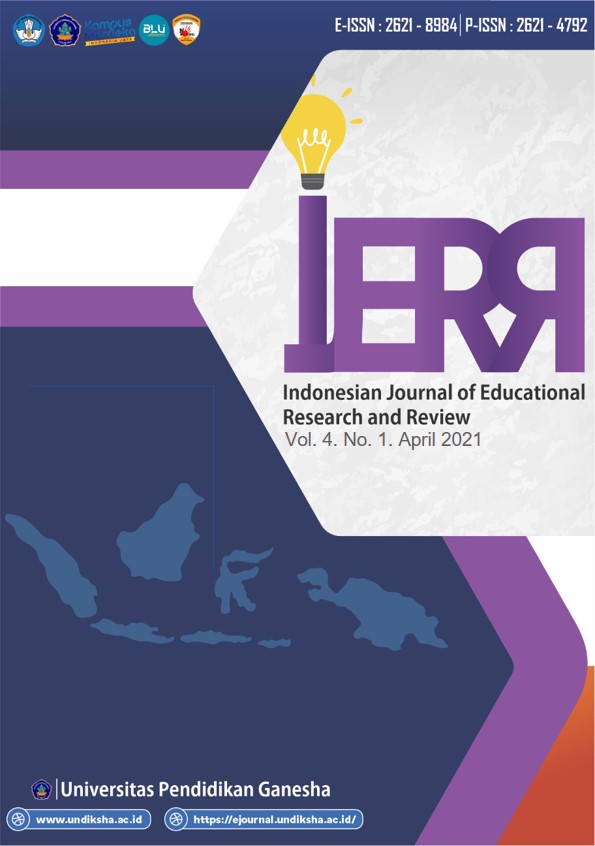Research Production at King Khalid University: Perceptions, Challenges, and Suggestions for Improvement
DOI:
https://doi.org/10.23887/ijerr.v4i1.31964Keywords:
Perceptions, Challenges, Research ProductionAbstract
Scientific research is very important since it contributes to the development of nations worldwide. However, there is a scarcity of empirical research conducted to investigate the challenges of research production among faculty members at universities. The present study seeks to explore the perceptions, challenges, and suggestions to improve research production at King Khalid University, Saudi Arabia. A questionnaire) was used to collect the data of the present study. The sample of this study included 55 faculty members from the Faculty of Languages and Translation at King Khalid University. The findings revealed that the long waiting period for manuscript publication, lack of allocated time for research, and lack of research training programs were the most prominent challenges in research production. The participants have also stated some suggestions to improve research production such as conducting research training programs, providing research incentives, and providing adequate research facilities.
References
Abouchedid, K., & Abdelnour, G. (2015). Faculty research productivity in six Arab countries. International Review of Education, 61(5), 673-690. https://doi.org/10.1007/s11159-015-9518-5.
Alzahrani, J. (2011). Overcoming Barriers to improve research productivity in Saudi Arabia. International Journal of Business and Social Science, 2(19), 50-57. http://ijbssnet.com/journals/Vol_2_No_19_Special_Issue_October_2011/5.pdf.
Angaiz, D. (2015). An investigation of teachers’ education faculty research productivity in public sector universities of Pakistan. Unpublished doctoral dissertation, Dowling College, New York, USA.
Batooli, Z., & Nazari, M. (2014). The features of social research network for facilitating research activities from medical sciences researchers’ perspective. Journal of Payavard Salamat, 8(4), 316-331.
Burton, H., & Walters, L. (2013). Access to Medicare-funded annual comprehensive health assessments for rural people with intellectual disability. Rural and remote health 13(3):2278. https://doi.org/10.22605/RRH2278.
Dadipoor, S., Ramezankhani, A., Aghamolaei, T., Rakhshani, F., & Safari-Moradabadi, A. (2018). Evaluation of health literacy in the Iranian population. Health Scope, 7(3), e62212. http://eprints.hums.ac.ir/5903/.
Fawzi, H., & Al-Hattami, A. (2017). Faculty production of research papers: Challenges and recommendations. International Journal of Humanities and Social Science, 7(2), 221-228.
Gonzalez-Brambila, C. and F. Veloso (2007). The determinants of research productivity: A study of Mexican researchers. Research Policy, 36(7) 1035-1051. https://doi.org/10.1016/j.respol.2007.03.005.
Hagan, J. L., Armbruster, P., & Ballard, R. (2019). Barriers to research among faculty at a health sciences university. American Journal of Educational Research, 7(1), 44-48. http://article.scieducationalresearch.com/pdf/EDUCATION-7-1-7.pdf.
Hoffmann, K., Berg, S., & Koufogiannakis, D. (2014). Success in research: Factors that contribute to increased research productivity across librarianship and other disciplines. Paper presented at the 42ndAnnual Conference of CAIS, Canadian Association for Information Science, Brock University - St. Cathartines, Ontario, May 28- 30, 2014. https://doi.org/10.29173/cais852.
Karloak, M. (2012). Bahrain’s tertiary education reform: a step towards sustainable economic development. Revue des mondesmusulmans et de la Méditerranée [English], 131(3). https://doi.org/10.4000/remmm.7665.
Kasetsart, J. (2009). Factors Affecting Research Productivity of Faculty Members in Government Universities: Lisrel and Neural Network Analyses. Social Sciences, 30, 67 -78. https://so04.tci-thaijo.org/index.php/kjss/article/view/246489.
Kendagor, S. T, Kosgei D, Tuitoek D., and Chelangat S. (2012). Factors affecting research productivity in public universities of Kenya: The case of Moi University, Eldoret. Journal of Emerging Trends in Economics and Management Sciences, 3(5),475-484. https://hdl.handle.net/10520/EJC127672.
Okoduwa, S. I., Abe, J. O., Samuel, B. I., Chris, A. O., Oladimeji, R. A., Idowu, O. O., & Okoduwa, U. J. (2018). Attitudes, Perceptions, and Barriers to Research and Publishing Among Research and Teaching Staff in a Nigerian Research Institute. Frontiers in Research Metrics and Analytics, 3, 26. https://doi.org/10.3389/frma.2018.00026.
Shauman, K. A., & Xie, Y. (2003). Explaining sex differences in publication productivity among postsecondary faculty. In Equal rites, unequal outcomes (pp. 175-208). Springer, Dordrecht. https://doi.org/10.1007/978-94-010-0007-9_8.
Sotodeh Asl, N., Ghorbani, R., & Rashidy-Pour, A. (2014). Viewpoints of faculty members of Semnan University of Medical Sciences about research barriers. Koomesh, 1-7. http://eprints.semums.ac.ir/346/.
Webber, K. L. (2010). Measuring faculty productivity. In: Shin, et al [Eds], University Rankings: Theoretical Basis, Methodology and Impacts on Global Higher Education, 105-121, New York: Springer.
Zhou, J. (2014) Problems teachers face when doing action research and finding possible solutions. Chinese Education & Society, 45(4), 68-80. https://doi.org/10.2753/CED1061-1932450405.
Downloads
Published
How to Cite
Issue
Section
License
Authors who publish with the Indonesian Journal of Educational Research and Review (IJERR) agree to the following terms:
- Authors retain copyright and grant the journal the right of first publication with the work simultaneously licensed under a Creative Commons Attribution-ShareAlike 4.0 International License. that allows others to share the work with an acknowledgment of the work's authorship and initial publication in this journal.
- Authors are able to enter into separate, additional contractual arrangements for the non-exclusive distribution of the journal's published version of the work (e.g., post it to an institutional repository or publish it in a book), with an acknowledgment of its initial publication in this journal.
- Authors are permitted and encouraged to post their work online (e.g., in institutional repositories or on their website) prior to and during the submission process, as it can lead to productive exchanges, as well as earlier and greater citation of published work. (See The Effect of Open Access)









